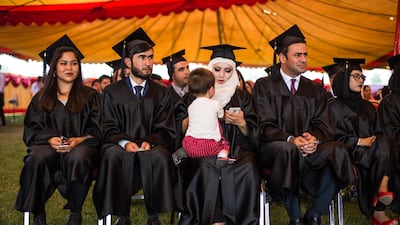Early on Saturday morning, a group of enthusiastic young students at the American University in Afghanistan (AUAF) donned their graduation robes and hats, ready to accept their hard-earned degrees.
As the young Afghan students stood excitedly in neat rows, a young mother among them with her baby, no one had forgotten that less than a year ago this very institute in Kabul was the site of a brutal massacre — a Taliban attack on August 24, 2016 that killed at least 13 students and staff members.
Addressing the students, Kenneth Holland, university president at AUAF, praised their achievement.
“While today, our hearts are still heavy with the loss of faculty members and students, we are heartened by the dedication and courage of our community and the parents of AUAF students and we know that our hard work and sacrifice will have monumental impact,” he said to the 110 young men and women receiving their bachelor and master's degrees in various subjects including law, business, political science and information technology.
Seven degrees were awarded posthumously to the students who were killed in the 2016 attack.
The university has had a difficult year. A month before the attack last August, two of its foreign professors were kidnapped by the Taliban and remain in captivity today. In a video released last month, the Taliban offered to free them in exchange for fighters in Afghan prisons.
More recently, the university lost Rahmatullah Nasiry, an instructor at the Professional Development Institute, and student Aziz Ahmad Navin, in the May 31 attack on Kabul’s diplomatic quarter. More than 150 people were killed when a lorry laden with explosives blew up there.
The 2016 attack, the only one to strike the university's premises, forced the administration to shut down operations for nearly seven months. The university reopened in March this year with little fanfare, but an unexpectedly large number of returning students who were eager to restart their courses.
"That is a clear message about what the Afghan people want: they want education and opportunities for their children to develop their human potential. They reject terrorism that aims to put Afghanistan back," Ahmad Shuja, director of development at AUAF, told The National.
“We have been there and it is not a good place to be, and only education for the next generation can take us out of it,” he added.
Soraya, 24, a business management graduate, lost one of her close friends in last year's attack.
“He had big ambitions for Afghanistan," Soraya said of her friend, Jamshid Zafar. "I came back to continue what he had dreamed for Afghanistan. It felt great to be reaching this milestone; and I had my friend on my mind the whole time today. Those martyred will always live as a symbol of strength in my hearts.”
Education in Afghanistan, especially for women, is beset with social and economic hurdles. There are few universities that provide technical and vocational training and even fewer with courses to match international standards and the demands of industry. AUAF is considered prestigious with standardised courses taught by experienced international and national staff, but it has provoked disapproval from extremist groups in the country, who see the university's progressive platform as a threat.
Despite the attacks on AUAF, more than 1,000 students, mostly Afghans, have graduated from the university's undergraduate and master’s programmes since its establishment in 2006.
With renovated infrastructure and improved security, the students and staff said on Saturday they were ready to move on with stronger resilience.
“We witnessed students, including girls, who came back to campus after we reopened,” said Mr Shuja. “We had students who recovered from their physical wounds — and those who are still recovering — show up on the first day of class when we reopened. We are witnessing this extraordinary commitment to education in the face of unspeakable violence.”
In fact, the incoming class who started in March was one of the biggest in AUAF history, he said.
Soraya agreed. “The attack may have an impact on women’s education, but we cannot give up,” she said. “We will use this tragedy to build our capacity and show our enemies that they cannot win.”
But though the physical scars have healed, those who survived the attack remain deeply traumatised. Many, especially women, were forced to drop out of school and several have needed counselling — which the university administration organised — to help them go on as before.
“There are still emotional scars and we are coming together as a community to heal, “ Mr Shuia said. “Events like today's graduation reassure us that although our scars are deep, they don't overwhelm us.”
